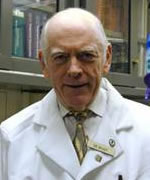Roscoe Brady, M.D.

Roscoe Brady, M.D., has dedicated most of his research career to unveiling the mysteries surrounding human hereditary metabolic disorders. His accomplishments include identifying the metabolic defects in lipid storage disorders such as Gaucher, Niemann-Pick, Fabry, and Tay-Sachs disease. He and his coworkers were responsible for establishing the effectiveness of enzyme replacement therapy in Gaucher disease.
An undergraduate at Pennsylvania State University from 1941 to 1943, Dr. Brady attended Harvard Medical School, where he graduated in 1947. Dr. Brady interned at the hospital of the University of Pennsylvania. From 1948 to 1952, he was a research fellow at the University of Pennsylvania medical school’s physiological chemistry department, and a clinical fellow in the endocrine section of the Department of Medicine. He served two and one-half years in the U.S. Naval Medical Corps. In 1954, he obtained a position at the National Institutes of Health in Bethesda, Maryland, and in 1972, he became Chief of the Developmental and Metabolic Neurology Branch in the National Institute of Neurological Disorders and Stroke. Dr. Brady has been a Scientist Emeritus at the National Institutes of Health since January 2006.
Dr. Brady’s specific medical research is centered on identifying and treating metabolic storage disorders. He developed diagnostic tests, carrier identification procedures, and prenatal detection methods for the diseases mentioned earlier. Dr. Brady has made impressive contributions to enzyme replacement therapy, extending its application to inherited enzyme deficiency disorders in addition to his groundbreaking work on Gaucher disease. His two current projects are improving treatment for patients with Fabry disease and advancing gene therapy for these diseases.
While practicing and researching medicine is his passion, Dr. Brady finds the time to extend his work beyond the hospital, as a writer and editor of scientific publications. He has published over 500 scientific articles, and is the editor of five scientific journals. Also, Dr. Brady is a member of several medical advisory boards.
The evidence of Dr. Brady’s hard work is seen not only in the actual medical progress he has made, but in the numerous awards and points of recognition that he has received over the years. Dr. Brady is a recipient of the Gairdner Foundation International Award, the Distinguished Service Award from the Department of Health, Education and Welfare, the Poiley Award from the New York Academy of Science, and the Cotzias Award from the American Academy of Neurology. Pennsylvania State granted him their distinguished Alumni Award in 1981, and Dr. Brady received the Passano Award and the Lasker Clinical Medical Award in 1992. Further, Dr. Brady received the Kovalenko Award from the National Academy of Sciences in 1991 and New York University honored him with their School of Medicine Award for Research in Neurogenetics in 1998. He received the U.S. National Medal of Technology and Innovation in 2008. He is a member of the National Academy of Sciences, USA and the Institute of Medicine of the National Academy of Sciences. Dr. Brady’s contributions in providing treatment for Gaucher disease are recognized and respected worldwide.
Dr. Brady is a member of the Scientific Advisory Board for the Children’s Gaucher Research Fund






